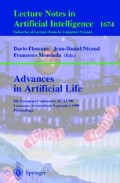Abstract
This paper deals with the problem of finding a suitable framework for designing computer simulations that could help us determine the minimal requirements (both material and organizational) for the origin of the first full-fledged autonomous systems. The design of a particular model that takes into account some fundamental thermodynamic requirements is offered and discussed. Behind this work, there is a belief that Artificial Life models can inform biology on several fundamental questions (such as the origin and definition of life) but only provided that they assume more realistic and grounded premises to lead us to more conclusive results.
Access this chapter
Tax calculation will be finalised at checkout
Purchases are for personal use only
Preview
Unable to display preview. Download preview PDF.
References
Bachman, P.A., Luisi, P.L., Lang, J.: Autocatalytic self-replicating micelles as models for prebiotic structures. Nature. 357 (1992) 57–59
Bro, P.: Chemical Reaction Automata. Complexity. 2(3) (1997) 38–44
Deamer, D.W.: Membrane compartments in prebiotic evolution. In: Brack, A. (ed.): The Molecular Origins of Life. Assembling the Pieces of the Puzzle. Cambridge University Press, Cambridge (1998)
Edwards, L., Peng, Y., Reggia, J.: Computational Models for the Formation of Protocell Structures. Artificial Life. 4 (1998) 61–67
Farmer, J.D., Kauffman, S. & Packard, N.H.: Autocatalytic replication of polymers. Physica 22 D (1986) 50–67
Fontana, W.: Algorithmic chemistry. In: Langton, C. G., Taylor, C, Farmer, J.D., Rasmussen, S. (eds.): Artificial Life II. Addison-Wesley, Redwood City (1992) 159–209
Lazcano, A., Fox, G.E., Oró, J.: Life before DNA: The origin and evolution of early Archean cells. In: Mortlock, R.P. (ed.): The Evolution of Metabolic Function. CRC Press, Boca Raton (1992)
Luisi, P.L.: Chemical models of minimal autopoietic systems. In: Stein W., Varela, F.J. (eds.): Thinking about biology. Addison-Wesley, New Jersey (1993)
Maturana, H. R., Varela, F.J.: Autopoiesis and Cognition. The Realization of the Living. D. Riedel Publishing Company, Dordrecht (1980)
Mayer, B., Köhler, G., Rasmussen, S.: Simulation and dynamics of entropy-driven molecular self-assembly processes. Physical Review E, 55(4) (1997) 4489–4499
McMullin, B.: SCL: An Artificial Chemistry in Swarm. Santa Fe Institute Working Paper. (1997) Available at: http://www.santafe.edu/sfi/publications/Working-Papers/97-01-002
McMullin, B., Varela, F.: Rediscovering Computational Autopoiesis. In: Husbands P., Harvey I. (eds.): Fourth European Conference on Artificial Life. MIT Press, Cambridge, Mass. (1997) 38–47
Morán, F., Moreno, A., Montero, F., Minch, E.: Further steps towards a realistic description of the essence of life. In: Langton, C. G., Shimohara, K. (eds.): Artificial Life V. MIT Press, London (1997) 255–263
Moreno, A., Ruiz-Mirazo, K.: Metabolism and the problem of its universalization. BioSystems 41(1) (1999)
Morowitz, H.J., Heinz, B., Deamer, D. W.: The chemical logic of a minimum protocell. Origns Life Evol. Biosph. 18 (1988) 281–287
Oparin, A.I.: Proiskhozhdenie zhizny. Izd. Moskovshii Rabochii, Moscow (1924) Reprinted in English in: Deamer, D.W., Fleischker, G.R. (eds.): Origins of Life. The Central Concepts. Jones and Barlett, Boston (1994) 31–71
Ruiz-Mirazo, K., Moreno, A., Morán, F.: Merging the energetic and the relational-constructive logic of life. In: Adami, C, Belew, R., Kitano, H., Taylor, C: Artifical Life VI. MIT Press, Cambridge Mass. (1998) 448–451
Skulachev, V.P.: The laws of cell energetics. Eur. J. Biochem. 208, (1992) 203–209
Taylor, T.: Nidus Design Document. Unpublished discussion document, available at: http://www.dai.ed.ac.uk/daidb/people/homes/timt/
Varela, F.: Principles of Biological Autonomy. Elsevier, New York
Wächtershäuser, W.: Before enzymes and templates: theory of surface metabolism. Microbiol. Rev. 52 (1988) 452–484
Author information
Authors and Affiliations
Editor information
Editors and Affiliations
Rights and permissions
Copyright information
© 1999 Springer-Verlag Berlin Heidelberg
About this paper
Cite this paper
Ruiz-Mirazo, K., Moreno, A., Morán, F., Peretó, J., Merelo, J.J. (1999). Designing a Simulation Model of a Self-Maintaining Cellular System. In: Floreano, D., Nicoud, JD., Mondada, F. (eds) Advances in Artificial Life. ECAL 1999. Lecture Notes in Computer Science(), vol 1674. Springer, Berlin, Heidelberg. https://doi.org/10.1007/3-540-48304-7_52
Download citation
DOI: https://doi.org/10.1007/3-540-48304-7_52
Publisher Name: Springer, Berlin, Heidelberg
Print ISBN: 978-3-540-66452-9
Online ISBN: 978-3-540-48304-5
eBook Packages: Springer Book Archive

